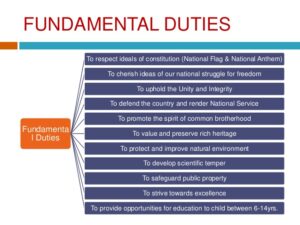HOW FUNDAMENTAL DUTY MAKE AN APPEARANCE IN CONSTITUTION!!
DEFINITION: The Fundamental duties defined as the moral obligations to all the citizens to help promote a spirit of patriotism and to uphold the unity of India. They are held by the Supreme Court to be obligatory for all the citizens.
When the Constitution was adopted in the year 1949, there were no provisions regarding Fundamental Duties to the Citizens though there was a Part III for Fundamental Rights.
- In 1976 while emergency Indian government formed a committee named Sardar Swaran Singh committee to make realization of duties to the citizens.
- The committee recommended that we should introduce a separate dedicated chapter for fundamental duties, so that the individual did not overlook his duties while in exercise of his Fundamental Rights.
- The government came up with 42nd amendment. A new Chapter IV-A which consists of only one Article 51-A was added.
- Initially there were 10 fundamental duties.
- By the 86th amendment act, 2002 added a duty & fundamental duties increased to 11 during Atal Bihari Vajpayee’s government.
- Inclusion of fundamental duties in Indian constitution also bring it in line with Article 29(1) of Universal Declaration Of Human Rights.
BASIS OF FUNDAMENTAL DUTIES
- The concept of Fundamental duties was taken from the USSR.
- These are essentially taken from the Indian tradition, mythology, religions and practices. Essentially these were the duties that are the codification of tasks integral to the Indian way of life.
- Fundamental Duties are defined as the moral obligations of all citizens to help promote a spirit of patriotism and to uphold the unity of India and are only applicable on citizens of India.
- Rights & duties of citizens are correlative & inseparable.
OBJECTIVE OF FUNDAMENTAL DUTIES
- Warning against anti social activities
- Reminder of duties of citizens
- Promote discipline and commitment.
APPLICABILITY/CRITICISM OF FUNDAMENTAL DUTIES
- Not Exhaustive : it doesn’t contain other important duties like casting vote ,paying taxes, family planning etc
- Non Justifiable : it can’t be questioned in the court of law for enforcement.
- Sanctionless duties : there is no legal sanction against their violation.
Note : Parliament is free to enforce them by suitable legislation.
CASE LAWS
- Bijoe Emmanuel v. state of kerala ( National anthem case )
In this case it was said that on personal religion or on the sentiments of faith if you can’t sing National Anthem then it is ok, but Article 51-A clause (a) says that it is every citizens duty to respect National Anthem and National Flag (Prevention of insults to National Honour Act, 1971)
- M C Mehta v. union of India 1983 (to enjoy pollution free environment)
In this case it is said that for fulfilling the mandate of clause (g) of Article 51-A on every educational institute, central government should introduce the lessons on protection & improvement of Natural Environment for fulfilling the mandate of the Article, Wild life (protection act) & Forest (conservation act ) helps it.
LEGAL PROVISIONS FOR IMPLIMENTATION OF FUNDAMENTAL DUTIES
The Verma committee (1999) identified the existence of following legal provisions
- Prevention of insults to National Honour Act, 1971.
- Various criminal laws provide for punishment for encouraging enmity & discrimination.
- Protection of Civil Rights Act, 1955.
- The Indian Penal Code declares the imputations and assertions prejudicial to national integration as punishable offence.
- Representation of People Act, 1951.
- The wildlife Protection Act, 1972
- Forest Conservation Act, 1980.
DUTIES AUTOMATICALLY ENFORCED THROUGH LEGISLATION
These 4 duties out of 11 (a,g,I,k) are automatically enforceable :-
(a) Abide by the constitution & respect the National Flag & The National Anthem.
(g) Protect & improve the natural environment.
(i) Safeguard public property & to abjure violence.
(k) Provide opportunities for education to his child/ward between the age of 6 to 14 years. 

